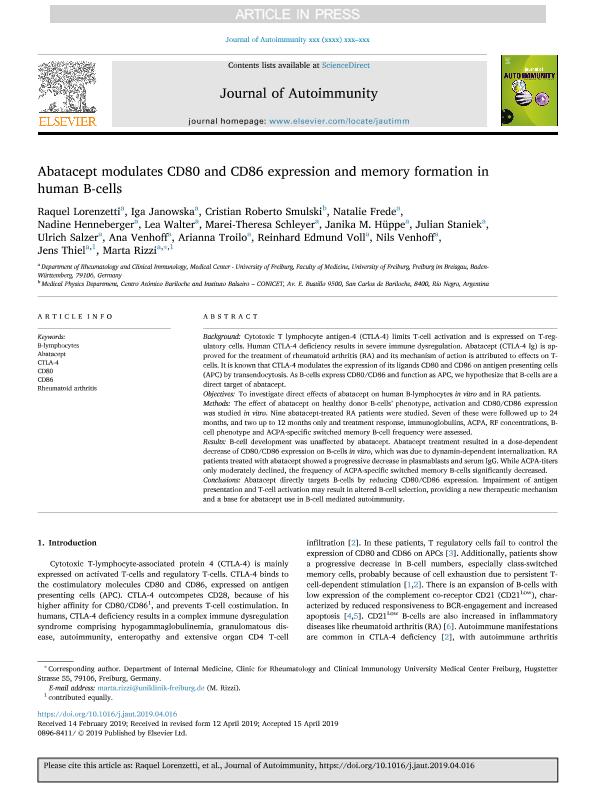Artículo
Abatacept modulates CD80 and CD86 expression and memory formation in human B-cells
Lorenzetti, Raquel; Janowska, Iga; Smulski, Cristian Roberto ; Frede, Natalie; Henneberger, Nadine; Walter, Lea; Schleyer, Marei-Theresa; Hüppe, Janika M.; Staniek, Julian; Salzer, Ulrich; Venhoff, Ana; Troilo, Arianna; Voll, Reinhard Edmund; Venhoff, Nils; Thiel, Jens; Rizzi, Marta
; Frede, Natalie; Henneberger, Nadine; Walter, Lea; Schleyer, Marei-Theresa; Hüppe, Janika M.; Staniek, Julian; Salzer, Ulrich; Venhoff, Ana; Troilo, Arianna; Voll, Reinhard Edmund; Venhoff, Nils; Thiel, Jens; Rizzi, Marta
 ; Frede, Natalie; Henneberger, Nadine; Walter, Lea; Schleyer, Marei-Theresa; Hüppe, Janika M.; Staniek, Julian; Salzer, Ulrich; Venhoff, Ana; Troilo, Arianna; Voll, Reinhard Edmund; Venhoff, Nils; Thiel, Jens; Rizzi, Marta
; Frede, Natalie; Henneberger, Nadine; Walter, Lea; Schleyer, Marei-Theresa; Hüppe, Janika M.; Staniek, Julian; Salzer, Ulrich; Venhoff, Ana; Troilo, Arianna; Voll, Reinhard Edmund; Venhoff, Nils; Thiel, Jens; Rizzi, Marta
Fecha de publicación:
07/2019
Editorial:
Academic Press Ltd - Elsevier Science Ltd
Revista:
Journal of Autoimmunity
ISSN:
0896-8411
Idioma:
Inglés
Tipo de recurso:
Artículo publicado
Clasificación temática:
Resumen
Background: Cytotoxic T lymphocyte antigen-4 (CTLA-4) limits T-cell activation and is expressed on T-regulatory cells. Human CTLA-4 deficiency results in severe immune dysregulation. Abatacept (CTLA-4 Ig) is approved for the treatment of rheumatoid arthritis (RA) and its mechanism of action is attributed to effects on T-cells. It is known that CTLA-4 modulates the expression of its ligands CD80 and CD86 on antigen presenting cells (APC) by transendocytosis. As B-cells express CD80/CD86 and function as APC, we hypothesize that B-cells are a direct target of abatacept.
Objectives: To investigate direct effects of abatacept on human B-lymphocytes in vitro and in RA patients.
Methods: The effect of abatacept on healthy donor B-cells’ phenotype, activation and CD80/CD86 expression was studied in vitro. Nine abatacept-treated RA patients were studied. Seven of these were followed up to 24 months, and two up to 12 months only and treatment response, immunoglobulins, ACPA, RF concentrations, B-cell phenotype and ACPA-specific switched memory B-cell frequency were assessed.
Results: B-cell development was unaffected by abatacept. Abatacept treatment resulted in a dose-dependent decrease of CD80/CD86 expression on B-cells in vitro, which was due to dynamin-dependent internalization. RA patients treated with abatacept showed a progressive decrease in plasmablasts and serum IgG. While ACPA-titers only moderately declined, the frequency of ACPA-specific switched memory B-cells significantly decreased.
Conclusions: Abatacept directly targets B-cells by reducing CD80/CD86 expression. Impairment of antigen presentation and T-cell activation may result in altered B-cell selection, providing a new therapeutic mechanism and a base for abatacept use in B-cell mediated autoimmunity.
Palabras clave:
ABATACEPT
,
B-LYMPHOCYTES
,
CD80
,
CD86
,
CTLA-4
,
RHEUMATOID ARTHRITIS
Archivos asociados
Licencia
Identificadores
Colecciones
Articulos(CCT - PATAGONIA NORTE)
Articulos de CTRO.CIENTIFICO TECNOL.CONICET - PATAGONIA NORTE
Articulos de CTRO.CIENTIFICO TECNOL.CONICET - PATAGONIA NORTE
Citación
Lorenzetti, Raquel; Janowska, Iga; Smulski, Cristian Roberto; Frede, Natalie; Henneberger, Nadine; et al.; Abatacept modulates CD80 and CD86 expression and memory formation in human B-cells; Academic Press Ltd - Elsevier Science Ltd; Journal of Autoimmunity; 101; 7-2019; 145-152
Compartir
Altmétricas



